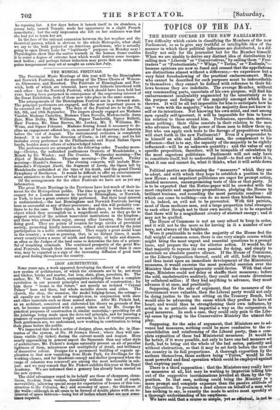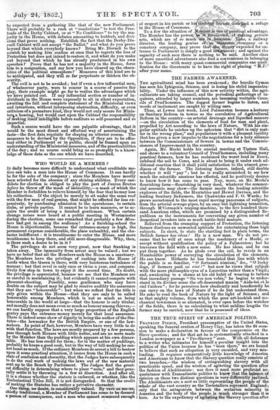TOPICS OF THE DAY.
THE RIGHT COURSE IN THE NEW PARLIAMENT.
TnE difficulty which exists in classifying the Members of the new Parliament, so as to give any truthful or intelligible idea of the manner in which their political influences are distributed, is a dif- ficulty not only for the journalist but for the Member himself. When we are unable to derive any distinct idea of distribution by calling men " Liberals " or " Conservatives," by calling them " Free- traders " or "Protectionists," " Whigs," " Tones," or " Radicals,"— because opinions are now so fused and crossed that the appellations are distinctions almost without a difference,—we experience but a very faint foreshadowing of the practical embarrassment. Men who cannot be described for such purposes must be indescribable
to themselves ; they cannot be defined with reference to their fel- lows because they are indefinite. The average Member, without any commanding parts, uncertain of his own purpose, will find his embarrassment incalculably augmented by the uncertainty as to the purpose and feelings of the majority amongst which he is thrown. It will be all but impossible for him to anticipate how he can " vote with the majority," when the majority does not know it- self or its intentions. Not knowing his own mind, and cast among men equally self-ignorant, it will be impossible for him to know his relation to those around him. Professions, speeches, motions, mean nothing ; their Value consists in their relation to the men who advance them, and the power of those men to follow them up. But who can apply such tests to the farrago of propositions which will start forth in the new Parliament ? Even if a propounder be in himself an able and influential man, the complement to his influence—that is to say, the capacity of the majority to be rightly influenced—will be an unknown quantity ; and the value of any specific proposition, therefore, will be incapable of calculation by the most sagacious politicians. Parliament will not only. have to constitute itself, but to understand itself—to find out what it is, what it can and cannot do, what it thinks, what it will settle down to.
Political parties are discussing the "measures" which they are to adopt, and with which they hope to establish a position in the new House ; and impatient politicians are eager for prompt action, decided measures, uncompromising tests of this or that party. It is to be expected that the Notice-paper will be crowded with the most emphatic and sagacious propositions, pledging the House to brilliant truisms, and recording the most patriotic resolves : all which can come to nothing—can do no more than hinder business. It is, indeed, an evil not to be prevented. With 654 patriots, most of them mediocre men, and a large proportion total strangers to each other though not to their own merits, it is to be expected that there will be a magnificent rivalry of abstract energy ; and it may not be quelled. The House of Commons is not an easy school to keep in order, and it will not be the more so for having in it a number of new boys, not always of the brightest. Were it practicable to make the majority of the House feel the full weight of common sense, there is one very simple course which might bring the most urgent and essential questions to a prompt issue, and prepare the way for ulterior action. It would be, for that majority to repress its own passion for doing, and simply to maintain an absolute passive silence. If the House of Commons, or the Liberal Opposition thereof, could sit still, hold its tongue, and thus insist upon an immediate development of the Ministerial measures, it would exercise the most powerful coercion over the Ministry that the utmost ingenuity could devise. With that clear stage, Ministers could not delay or shuffle their measures ; before the cold, unobstructive auditory, they could not create diversions by collateral sallies ; if they had anything to advance, they must advance it at once, and practically. Supposing, for the sake of argument, that the measures of the Government were valuable, then the liberal party would not only be doing justice to the men sitting on the Treasury Bench, but would also be advancing the cause which they profess to have at heart, and would thus be strengthening their own influence, by acting in so patriotic and impartial a way as the cooperators in good measures. In such a case, they could only gain to the Libe- ral cause by giving to the Conservative Ministry the utmost fair Play.
Supposing, for the sake of argument, that Ministers are to ad- vance bad measures, nothing could be more conducive to the re- consolidation and reinformmg of the Liberal party, than a com- plete exposition of these bad Ministerial measures. It would be far better, if it were possible, not only to have one bad measure set forth, but to bring out the whole of the bad series, patiently and without obstruction, so that it may be set forth before the eyes of the country in its full proportions. A thorough exposition by the authors themselves, those authors being "Tories," would be the most powerful and final operation which could be employed against that expiring party. There is a third supposition : that the Ministers may really have no measures at all, but maybe waiting to improvise telling hits out of the suggestive incriminations levelled at them by the Op- position. In that case, nothing could bring the Ministry to a more prompt and complete exposure than the passive attitude of the Opposition. To proclaim a dead silence on behalf of a man who has nothing to say, is exactly the mode to arrive most speedily at a thorough understanding othis emptiness. We have said that a course so simple, yet so effectual, hboot to be expected from a gathering like that of the new Parliament. There will probably be a rush at " resolutions " to test the Free- trade of the Derby- Cabinet, or at " No Confidence " to try the ma- jority in the House, with debates amounting to hubbub, and divi- sions that prove nothing. Establish the fact that the Derby-Dis- raeli Cabinet will not accept "the Ballot," and what do you prove beyond that which everybody knows ? Bring Mr. Disraeli to the scratch by making him confess at once that he regrets the loss of Protection but does not intend to restore it, and what do you make out beyond that which he has already proclaimed in his own speeches ? Prove that he has not a majority in the House, force him to a resignation, and say how you have cleared up the obscu- rities of the political atmosphere? Measures of this kind are to be anticipated, and they will so far perpetuate or thicken the ob- scurity.
The evil is not to be avoided ; but if even a few influential men, of whatsoever party, were to concur in a course of passive fair play, their example might go far to realize the advantages which we have pointed out. If any influential section or number of in- dividuals in the House were expressly to sit in silent expectation, awaiting the full and complete statement of the Ministerial views and intentions, without interposing obstruction, difficulty, or even criticism of a premature kind, they would not only secure for Minis- tap hearing, but would cast upon the Cabinet the responsibility of making itself intelligible before auditors so self-possessed and so impartial. Such a course would have the one palpable advantage, that it would be the most direct and effectual way of ascertaining the facts—the first data requisite for shaping an ulterior course. The measures to be devised by the Opposition, if they are to be effec- tual either in Parliament or in public, should be framed upon an understanding of the Ministerial measures, and of the praeticabilities of the day ; and no course could bring us so promptly to a know- ledge of these data as the one which we have described.



























 Previous page
Previous page